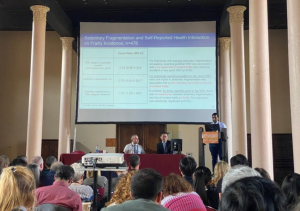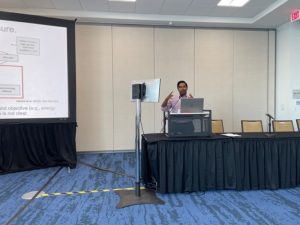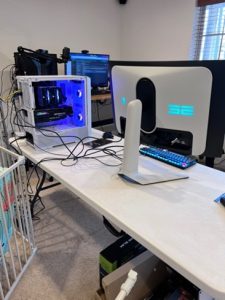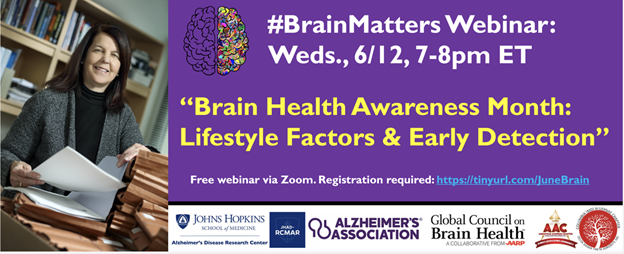
The Center is pleased to announce that the Spring 2024 COAH Champion honor is bestowed upon our Core Faculty member Dr. Amal A. Wanigatunga, Assistant Professor with the Department of Epidemiology at the Bloomberg School of Public Health (BSPH). Dr. Wanigatunga’s research focuses on: physical activity and sedentary behavior; technology; wearables; aging; disability; and dementia. Also, he is a key contributor at BSPH’s ENGAGE Lab, which aims to understand changes in physical activity and energy expenditure with aging, and how they contribute to changes in physical and cognitive health.
Tony Teano: Congratulations on being pronounced the COAH Champion for the Spring Term! And thank you for taking the time to answer a few personal and professional questions that will allow us to get to know you better as an academic researcher and as a real person. To start, please tell us about your background, education, and path to COAH.
Dr. Wanigatunga: I was born in Staten Island, New York, but I spent almost all of my childhood in New Jersey and Florida. I completed all my undergraduate and graduate training at the University of Florida (Go Gators!). Both my parents are chemists, so I naturally went into chemistry for my undergraduate degree. After graduating, I completed an ORISE fellowship at the CDC focused on toxic chemical biomonitoring from everyday products. It was there I first saw an epidemiologist using the data we collected and making inferences at a population level. This is where I was introduced to public health and prevention. Afterwards, I went to get my MPH, and I met a fantastic exercise physiologist and epidemiologist, Dr. Todd Manini. He showed me that you can learn so much about someone’s health just by the way they move and function. This got me hooked into physical activity and aging research. Under Todd’s mentorship, I earned my epidemiology PhD and gerontology certificate and through his collaborations, met Dr. Jennifer Schrack (now our COAH director). She convinced me to join her as a postdoctoral fellow at Hopkins, and the rest is history!
Tony Teano: I think it is amazing how the influence of a few people are oftentimes the great catalysts for life-changing pathways to open up before us! And you continue to participate in research collaborations about aging and physical activity with amazing colleagues, not the least of which is Dr. Schrack. As you reflect on your prolific research, what paper are you most known for or most proud of?

Dr. Wanigatunga: It is difficult to select one paper—they all contribute to the science in their own unique way. Most people know me through my research using accelerometry to measure physical activity. Some of our most cited work examines the various ways we can extract useful measures of physical activity and see how they are related to health. As of right now, a large body of research focuses on exercise and its influence on brain health. So, I think some of the most interesting papers we recently published or are getting ready to publish are where we challenge readers to also think how the brain controls movement-based behavior by showing evidence to this relationship. These papers suggest we might be able to capture early aging- and disease-specific patterns of daily movement loss. For example, in relation to brain disorders like dementia, capturing subtle and specific changes in movement might inform early screening efforts to detect and intervene on preventable declines in cognition.
Tony Teano: That’s a great example of how your research is directly applicable to real people today facing real challenges in the now. I appreciate research that can be translated and implemented very quickly from bench to bedside. Why did you decide to focus on this area—aging and movement?
Dr. Wanigatunga: Physical activity is involved with nearly everything intrinsically and extrinsically when related to health. Aging is inescapable—often described as entropy—and it is one of the most understood health risk factors. The intersection of both physical activity and aging nearly affects everyone globally. One of the most promising ways to maintain a high quality of life as we age (or slow intrinsic entropy) is to be active! Yet, being active is not just willpower, motivation, or driven by goals–but it is also largely determined by context and extrinsic factors (e.g., environmental build, access to medications, etc.). I see a lot still needs to be done in the worlds of physical activity and in aging, but much can be effectively accomplished when combining both fields together.
Tony Teano: Tell us more about encompassing aging and also physical activity as a combined research topic. What are you currently researching in this space?
Dr. Wanigatunga: I think the main driver to why we are so physically inactive these days is because of unintended consequences of technological advances—which increase convenience and extend life, but also “engineer” activity out of our lifestyles and possibly increase life lived with debility. To me, there is an immediate need to “re-engineer” activity back into our daily lives that require less effort than structured exercise, but as effectively improve quality of physical and mental health. My main focus is finding simple and effective ways to replace excessive sitting with very light physical activity. The goal is to study ways sedentary behavior reduction can be used as an effective first step towards initiating an active lifestyle. While—dare I say—everyone knows exercise is good for health, there are very real barriers to engaging in an active lifestyle. These barriers expand and are magnified with age. Yet, engaging in any amount of activity (above and beyond the daily routine) seems to be beneficial not only for the body but also for the mind, regardless of age. I think addressing this need is most impactful among our older adult populations, who often (and largely unintentionally) experience ageism from their family, friends, and even practitioners who operate under the misguided notion that “slowing down” or “being inactive” is normal for older adults.
Tony Teano: That is an interesting paradox with unforeseen consequences. I’m so glad you’re bringing rigorous data to these questions through your research findings, and seeking practical, workable solutions from which many will undoubtedly benefit. It has to be gratifying work. So… what is the best and worst part of your job?

Dr. Wanigatunga: The best part of my job is that I get to work with amazing people who inspire me and who share similar priorities towards caring about the health and interconnectedness of our communities. The worst part of my job is seeing trainees and collaborators eventually leave, but I am happy they are going on to do great things!
Tony Teano: Those are very kind-hearted sentiments. And, yes, from looking at your research collaborations, I can see that you team up with some amazing, dynamic people, who—like you—have keen insights as researchers and who are otherwise also great people. Now, let’s pivot to a few personal questions. Over the last few years, it seems like burnout has been a trending topic. It takes practice to form habits that rejuvenate the self. Please tell is about any hobbies or interests that give you an opportunity to relax, refresh, and renew.

Dr. Wanigatunga: My wife, Sarah, and I try to go out once a week or two to unplug. We have a two-year-old son, Kian, and I love chasing him around and learning the world from the ground up with him. Also, I played a lot of sports when I was younger, but it has narrowed to largely just tennis. I like to work out and one thing that crosses my personal and professional interest is trying different work out programs available to the general public (e.g., HIIT, dance, shadow boxing, etc.) to see how different people create popular exercise programs. I also like all things technology and DIY, which can be an expensive hobby. I build my own computers, and these days I am learning to develop the software that goes with the hardware. Lastly, my old college buddies and I keep in touch by playing computer games together (e.g., Rocket League) when we can swing it. And as far as board games go it has been a while since I played, but Gloomhaven is really fun!

Tony Teano: That’s a very well-rounded assortment of activities that are really quite holistic when taken altogether—to nurture treasured relationships and be social, and to keep the body and mind fit and active! You’re a great role-model! Now let’s talk about a few of your personal favorites in popular culture. Who are you a fan of in the entertainment industry?
Dr. Wanigatunga: There are so many films I love but one that always makes me laugh and feel good is Galaxy Quest. There are so many big names in that movie, but one of my all-time favorite actors in it is Sam Rockwell! Also, I’m a fan of The Office.
Tony Teano: Clearly, you have a great sense of humor! Is there any additional fun fact to know and tell you’d like us to know about your home life, family, where you grew up, etc.?
Dr. Wanigatunga: When I was in elementary school, we could spend our PE class learning how to juggle. I spent so much time learning to juggle during that time that I can juggle scarves, balls (up to four), rings, and pins.
Tony Teano: I think it might be time for a COAH Talent Show! That is wonderful. And I’m sure that skill fascinates your two-year-old, and amuses children of all ages. Since I know you’re juggling a lot of things—including several forthcoming research papers—I will bring this interview to a close. Thanks again so much for allowing us to get to know you better.

Recent Research:
- Relationship between skeletal mitochondrial function and digital markers of free-living physical activity in older adults
- Differences in Daily Physical Activity by Alzheimer’s Risk Markers Among Older Adults
- Physical activity cut-points for older adults using the Zio XT onboard accelerometer
Keep up-to-date with Dr. Wanigatunga’s research; follow him on X (former Twitter) @AmalForResearch.
By Anthony L. Teano, MLA
Communications Specialist




